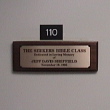|
|
|
|
2 Chronicles 24:1-16
- The Chronicler shows two sides to Joash - his reform and his
subsequent apostasy. The parallel account in Kings (2 Kings 12)
only shows Joash in a good light.
- Joash was seven when he became king and reigned for 40 years. (v. 1)
- Joash did what was pleasing to the Lord as long as his mentor, Jehoiada
the priest, was alive. (v. 2)
- Joash decided to restore the Temple of the Lord. (v. 4)
- Joash summoned the Levites and instructed them to collect taxes, but
they didn't go right away. (v. 5)
- 2 Kings 12:4-8 implies that the Levites were not being honest with the
money received. Perhaps Athaliah's wickedness corrupted the Levites.
- See Exodus 30:11-16 for the origin of the "tax levied by Moses."
- Joash questions Jehoiada about why the Levites didn't collect the
taxes. (v. 6)
- Over the years, followers of wicked Athaliah had desecrated the Temple.
(v. 7)
- Joash instructed that a chest be put in front of the Temple and used to
collect taxes when people come to the Temple. (v. 8-9)
- The people gladly brought their money and filled the chest with it.
(v. 10)
- Whenever the chest became full, the money was taken to the king's
officials where the money was counted. The empty chest was brought
back to the Temple. (v. 11)
- This is the first time that the requirement for upkeep of the Temple
is shifted from the king to the people. Perhaps Joash's resources were
not great enough to pay for the repairs and upkeep. Note that the
money was given freely as an appropriate response to God's blessing.
The people are a righteous people at this time and they recognize that
obedience and financial stewardship is the appropriate response.
- The money collected was used to hire workers for the Temple. (v. 12)
- After the Temple was repaired, the remaining money was used to recreate
the Temple utensils. (v. 13-14)
- Sacrifices continued as long as Jehoiada was alive. (v. 14)
- When Jehoiada died (at 130), he was buried among the kings in the City
of David, because he had done so much good in Israel for God and his
Temple. This is a great honor, as it is treatment that is normally
reserved for kings. (v. 15-16)
2 Chronicles 24:17-22
- Things were good while Jehoiada was alive, but after he died, things
got bad quick. (v. 17-19)
- The leaders of Judah persuaded Joash to listen to their ungodly
advice. (v. 17)
- They abandoned the Temple and worshiped the Ashera poles and idols
instead. (v. 18)
- The Lord sent prophets to warn the people and bring them back, but the
people wouldn't listen. (v. 19)
- The Holy Spirit empowered Jehoiada's son, Zechariah, to warn the people
of their sins. (v. 20)
- The Holy Spirit warned the people of Judah of their sin and told them
that they cannot disobey God and prosper. He convicts and convinces of
sin today, as well. Pay close attention to His warnings.
- The leaders of Judah and Joash plotted to kill Zechariah. (v. 21)
- Even Jesus commented on the murder of Zechariah. See Luke 11: 49-51.
- Zechariah's last words were to ask the Lord to hold the people
accountable for their sin. (v. 22)
- Zechariah's last words have been compared unfavorably with the last words
of Christ, Stephen, etc. but there is no intent that these words are to
be a mark against Zechariah. Instead, they are words that announce the
fate of Joash.
2 Chronicles 24:23-27
- The Aramean army attacked Judah and was victorious, even though
Joash's army was much larger. (v. 23-24)
- This defeat was a result of the people abandoning the Lord. (v. 24)
- Joash was severely wounded by the Arameans and assassinated by his own
officials. (v.25)
- Joash was buried in the City of David, but not in the royal cemetery.
(v. 25)
- Joash's son Amaziah became king after Joash.
- I think it's difficult to decide whether Joash was a good king or a bad
king. Because he led a small revival in Judah, I think it is safe to
say that he was, for the most part, a good king. But it is important to
note his apostasy and disgraceful death at the end of his reign.
|
